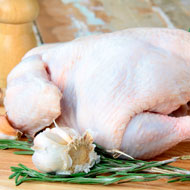New figures show fall in campylobacter cases

The FSA is changing the way it monitors levels of campylobacter on chickens at slaughterhouse level.
The number of human campylobacter cases in the UK fell by 17 per cent in 2016, according to new figures.
Published by the Foods Standards Agency (FSA), the figures also show that levels in chicken continue to decline.
From August to December 2016, seven per cent of chickens tested positive for the highest level of contamination, down from 12 per cent for the same period in 2015.
“The challenge we set of reducing the number of people who get ill from campylobacter has been achieved,” said Heather Hancock, chairman of the FSA.
“In the absence of any other clear indicators, we can reasonably say that the work that we and the food industry have done from farm to fork has given us this really positive result for public health.”
The individual results of the nine retailers with the highest market share show that five per cent of chickens tested positive for campylobacter within the highest band of contamination.
The percentage of chickens that tested positive for the presence of campylobacter at any level is 56 per cent, down from 66 per cent in 2015 and 78 per cent in 2014.
Hancock said that the reduction in the number of people getting ill from campylobacter was the result of industry bodies working together.
“This has been achieved by working with the industry to tackle this difficult problem and raising consumer awareness. We commend the efforts of the larger retailers and the major processing plants who supply them, all of which have shown significant improvement and many have achieved the target we set to reduce the highest levels ofcampylobacter. They have invested a lot of effort and money into interventions to tackle the problem.
“But there is more to be done and our focus now is on encouraging the smaller retailers and processors, who generally haven’t met target levels, to follow the lead of the major players and we are considering how we can best help them and monitor their progress.”
The FSA is changing the way it monitors levels of campylobacter on chickens at slaughterhouse level by ending the monitoring programme in its current form. It claims this will not impact on the retail survey and will be the method through which large processors and retailers will be measured.



 The Federation of Independent Veterinary Practices (FIVP) has announced a third season of its podcast, Practice Matters.
The Federation of Independent Veterinary Practices (FIVP) has announced a third season of its podcast, Practice Matters.